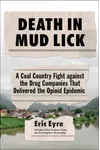Picture a tenacious journalist who peeled back the layers of a national crisis with nothing but grit and a notepad—meet Eric Eyre! This Pulitzer Prize-winning reporter from West Virginia turned the spotlight on the opioid epidemic, exposing corporate greed and government oversight failures. His book, Death in Mud Lick, isn’t just a story; it’s a battle cry for justice in the heart of Appalachia.
Eyre’s work is a masterclass in investigative journalism, blending hard-hitting data with human stories that stick with you. Despite facing personal challenges like Parkinson’s disease, he never backed down, making him a hero for those fighting the opioid crisis. Ready to dive into his world? Let’s go!
The Making of Eric Eyre
Born around 1965, Eric Eyre grew up with a curiosity that led him to journalism. After graduating from Loyola University of New Orleans, he earned a master’s in Mass Communication from the University of South Florida, sharpening his skills with an internship at the Tampa Bay Times. His early career took him to newspapers like The Anniston Star in Alabama and The Pottstown Mercury in Pennsylvania, where he honed his knack for digging deep.
In 1998, Eyre joined the Charleston Gazette-Mail, covering education, health, and business. West Virginia, with its struggling coal communities, became his beat and his muse. It was here, amid the rolling hills, that he found the story that would define his career: the opioid crisis ravaging Appalachia.
Eric Eyre’s Unforgettable Stories
Eyre’s breakout came in 2016 with a series of articles for the Charleston Gazette-Mail that exposed how drug distributors flooded West Virginia with 780 million pain pills over six years. His reporting, which won the 2017 Pulitzer Prize for Investigative Reporting, revealed shocking numbers—like a single pharmacy in Kermit, population 382, distributing 12 million opioid pills in three years. These stories weren’t just stats; they showed families torn apart and communities on the brink.
His book, Death in Mud Lick: A Coal Country Fight Against the Drug Companies That Delivered the Opioid Epidemic (2020), expanded this work into a gripping narrative. Part thriller, part exposé, it follows Debbie Preece, a woman seeking justice for her brother’s overdose, and Eyre’s own quest to uncover the truth. The book dives into clandestine meetings, court battles, and the raw data that shook drug giants like McKesson and Cardinal Health. Critics called it a “John Grisham thriller” with heart, earning spots on New York Times top book lists and the 2021 Edgar Award for Best Fact Crime.
Eyre’s style is clear, relentless, and human. He pairs jaw-dropping stats with stories of real people—coal miners, grandparents, and first responders—caught in the epidemic’s grip. His work doesn’t just inform; it demands accountability, shining a light on corporate negligence and regulatory failures.
Why Eric Eyre Matters
Eyre’s impact goes beyond awards. His reporting led to real change: West Virginia’s pharmacy board tightened regulations, and counties won multimillion-dollar settlements from drug distributors to fund addiction programs. By exposing the opioid crisis, he gave a voice to Appalachia, a region often overlooked, and inspired journalists nationwide to tackle tough stories. His courage, especially while battling Parkinson’s, proves one person can take on Goliath—and win.
In an era of shrinking newsrooms, Eyre’s work is a reminder of journalism’s power. He’s not just a reporter; he’s a beacon for truth in a world that needs it. His legacy? Hope, accountability, and a call to keep fighting for what’s right.
- Born: c. 1965
- Key Work: Death in Mud Lick (2020)
- Awards: Pulitzer Prize (2017), Edgar Award (2021)
- Notable: Exposed opioid crisis despite Parkinson’s diagnosis
Snag Death in Mud Lick and dive into Eric Eyre’s gripping world of truth-telling! You’ll be hooked—and maybe inspired to fight for justice, too.
